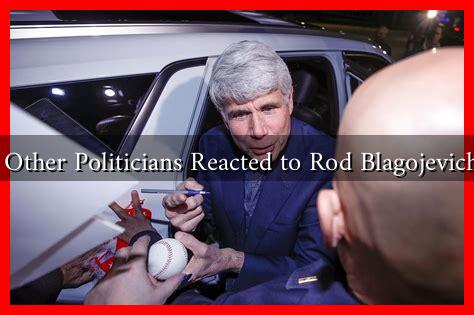-
Table of Contents
- How Have Other Politicians Reacted to Rod Blagojevich’s Release?
- Political Reactions: A Spectrum of Opinions
- Case Studies: Individual Politicians’ Responses
- J.B. Pritzker: A Cautious Approach
- Donald Trump: A Controversial Perspective
- Public Sentiment and Political Implications
- Conclusion: The Legacy of Blagojevich’s Release
How Have Other Politicians Reacted to Rod Blagojevich’s Release?
Rod Blagojevich, the former Governor of Illinois, was released from prison in February 2020 after serving eight years for corruption charges, including attempting to sell Barack Obama’s Senate seat. His release sparked a variety of reactions from politicians across the spectrum, reflecting the complex nature of political accountability and public perception. This article explores the responses from various political figures and the implications of Blagojevich’s release on the political landscape.
Political Reactions: A Spectrum of Opinions
The reactions to Blagojevich’s release were as diverse as the political affiliations of those responding. Some politicians expressed support for his release, while others condemned it.
. Here are some notable reactions:
- Support from Fellow Democrats: Some Democratic politicians viewed Blagojevich’s release as a chance for redemption. For instance, Illinois State Senator Emil Jones Jr. stated that Blagojevich had paid his debt to society and deserved a second chance.
- Criticism from Republicans: Many Republican leaders were quick to criticize the decision to release Blagojevich. Former Illinois Republican Party Chairman Tim Schneider called it a “disgrace,” emphasizing that Blagojevich’s actions had harmed the integrity of the political system.
- Mixed Reactions from Independents: Independent politicians and commentators had varied responses. Some acknowledged the flaws in the justice system that led to Blagojevich’s lengthy sentence, while others felt that his actions warranted a harsher punishment.
Case Studies: Individual Politicians’ Responses
To better understand the political landscape surrounding Blagojevich’s release, it is essential to examine specific case studies of individual politicians and their responses.
J.B. Pritzker: A Cautious Approach
Illinois Governor J.B. Pritzker, a Democrat, took a measured stance on Blagojevich’s release. While he acknowledged the complexities of the case, he emphasized the importance of focusing on the future of Illinois politics rather than dwelling on past scandals. Pritzker stated, “We need to move forward and ensure that our government is transparent and accountable.” His response reflects a desire to distance the current administration from Blagojevich’s legacy.
Donald Trump: A Controversial Perspective
Former President Donald Trump, who commuted Blagojevich’s sentence, framed his decision as an act of mercy. Trump argued that Blagojevich had been treated unfairly by the justice system. His comments ignited a firestorm of debate, with critics arguing that it undermined the seriousness of corruption in politics. Trump’s perspective highlights the polarizing nature of Blagojevich’s case and the broader implications for political accountability.
Public Sentiment and Political Implications
The reactions from politicians also reflect broader public sentiment regarding corruption and accountability in politics. Polls conducted after Blagojevich’s release indicated that a significant portion of the public remained skeptical about the integrity of elected officials. Key findings included:
- Approximately 60% of respondents believed that corruption in politics was a significant issue.
- Only 25% felt that Blagojevich’s release was justified, indicating a lack of public support for leniency in corruption cases.
- Many voters expressed a desire for stricter penalties for politicians convicted of corruption.
Conclusion: The Legacy of Blagojevich’s Release
Rod Blagojevich’s release from prison has elicited a wide range of reactions from politicians, reflecting the complexities of political accountability and public perception. While some see his release as an opportunity for redemption, others view it as a troubling sign of leniency towards corruption. The responses from figures like J.B. Pritzker and Donald Trump illustrate the polarized nature of contemporary politics, where corruption remains a critical issue for voters. As the political landscape continues to evolve, the legacy of Blagojevich’s case will likely influence discussions on ethics and accountability in government for years to come.
For further reading on political accountability and corruption, you can visit Brookings Institution.





